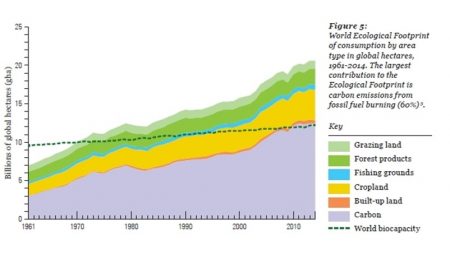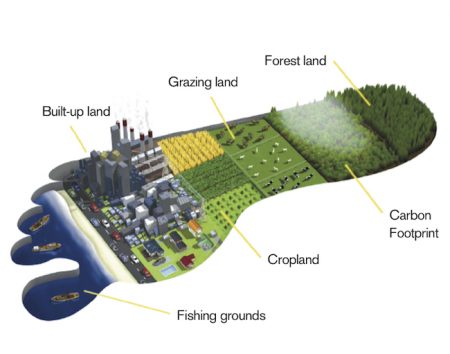February 4, 2019 – A delegation of 31 organizations within The Netherlands petitioned the government on January 22nd this year to drastically reduce the country’s ecological footprint within the next 10 years. The average person in The Netherlands today, based on lifestyle, is supported by the output of 5.9 hectares (over 14.5 acres) of land, more than three times the size of what is considered sustainable for the planet. That number has been calculated at 1.7 hectares (4.2 acres).
The petition was inspired by a government report acknowledging that the country’s “wealth and ecological footprint are attained at the expense of people elsewhere on Earth and seriously threaten the welfare of our children and future generations.”
The petitioners stressed that fighting greenhouse gas emissions was not enough. That the country needed to look at tackling the overuse of biological resources and of pollution in the environment.
Our average human ecological footprint, the amount of land and water needed to sustain each and every one of us, today is measured at 1.7 hectares which totals 12 billion hectares when you take into consideration the total population of the planet. But in 2012 our ecological footprint was already 2.84 hectares (7 acres) per person. That meant we were consuming 1.75 Earths to sustain us, and for the Dutch, based on 5.9 hectares per person, nearly 3.5 Earth equivalents.
In the petition it states the following:
“The ‘Broad Prosperity Monitor’ of the Dutch Central Statistics Bureau (CBS) makes clear that we have a global and ecological footprint. Because of this, we are violating many human rights. Fortunately, the government is planning to reduce our CO2 emissions considerably, because climate disruption is already a threat to the world and every year. change – for example, a dramatic decline in the biodiversity, quality, and productivity of agricultural and fishing grounds, our disproportionate claim on those grounds, and the pollution of the environment that is happening everywhere. Continuing to strive for even more unqualified economic growth is irresponsible. Effective and just measures are needed in a coherent way. That is why we urge the policy to drastically reduce our ecological footprint within 10 years.”
The “Broad Prosperity Monitor” referred to above, is a 124-page report published in 2018 in which is recorded the discussions of the Dutch Parliament about the country’s prosperity including current and future quality of life. The Parliament concluded that The Netherlands is unjustly using a larger part of the global ecospace than what is deemed sustainable. The report further noted that as long as the planet appeared to have enough space, there was no problem. But around 1970, humanity shot through what is described in the report as the sustainability barrier where the planet became too small for us.
The report further states that despite several serious warnings from organizations like the Club of Rome in 1972, the United Nations in 1987, and the most recent warning by 21,000 scientists from 184 countries in 2017, humanity continues to not take our ecological footprint seriously.
Stated Eric Wiebes, the Minister of Economic Affairs and Climate Policy, “It is no secret that the Netherlands has a large footprint. We also have the obligation to clean up our own mess.”
The petition goes on to describe the sacrifice Dutch society needs to make for the planet to be safer in the future, and that by reducing the country’s global footprint it ensures the survival of the future generations of all humanity.
Stated Ingrid Robeyns, of Utrecht University, “What we need is national unanimity as if we were in a war.”

The graph on the left shows a dotted line that indicates sustainable eco-capacity. Around 1970, based on the categories of land use and carbon output you can see how we exceeded the planet’s capacity to sustain us over the long term.
















